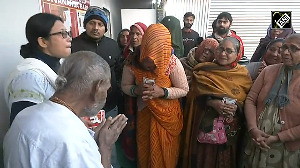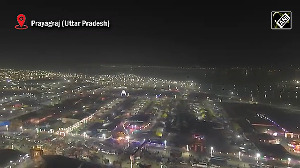The Budget clearly hails consumerism. On the one hand, the finance minister proposes to put more money in the hands of people by reducing their income tax burden and on the other, he has slashed excise duty on products such as motor cars, air-conditioners, pre-recorded audio cassette and compact discs.
What's more, you can enjoy these comforts sipping a soft drink or even imported liquor which will now become cheaper.
Besides, garments will now become more affordable. As the finance minister has proposed to cut excise duty on polyester filament yarn and cotton yarn by eight per cent. The excise duty on woven fabrics and garments have also been brought down by two per cent to 10 per cent this year.
There's great news for women too, as gold will now become cheaper. The customs duty on imported gold has been brought down to Rs 100 per 10 gm from the present level of Rs 250 per 10 gm on import of serially numbered bars or gold coins.
Even better, jewellery studded with precious stones will also be cheaper as the customs duty on cut and polished diamonds and gem stones is proposed to be reduced from the present 15 per cent to 5 per cent.
Health seems to be a priority for the finance minister. For one, the Budget proposes to maintain the high excise duty on paan masala and tobacco products. A fresh levy of eight per cent has also been imposed on branded edible refined oil and vanaspati to keep you away from too much of fried food.
Apart from this, there are several proposals aimed at bring down the healthcare cost of the masses. A large number of life saving drugs are either exempt from customs duty or attract a nominal five per cent duty which is proposed to be extend to some more drugs.
Life saving drugs currently attracting nil or five per cent customs duty will also be exempt from excise duty. Apart from this, incentives are given to private sector to the capacity of existing hospitals and set up new ones.
One of them includes, the sharp reduction in custom duty on specified life saving equipment from 25 per cent to five per cent, and also exempt them from countervailing duty.
That's not all. The Budget aims to cover ordinary citizens under health insurance by offering scheme at affordable rates of one rupee per day or Rs 365 per annum for an individual.
Currently, only 20 per cent of the total population is covered under health insurance in the country.
What's more, it will cost only Rs 1.5 per day for a family five and Rs 2 per day for a family of seven including dependents to get reimbursement of medical expenses up to Rs 30,000 towards hospitalisation, a cover for death due to accident for Rs 25,000, and compensation due to loss of earning at the rate of Rs 50 per day up to a maximum of 15 days.
But all is not well. The consumers will have to shell out more for the additional cess of 50 paisa per litre of diesel and petrol.
Moreover, the increase in service tax from five per cent to eight per cent will mean additional expenses for various services like mobile phones, restaurants, credit card and other banking services.






 © 2025
© 2025